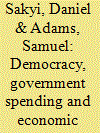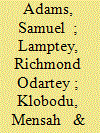|
|
|
Sort Order |
|
|
|
Items / Page
|
|
|
|
|
|
|
| Srl | Item |
| 1 |
ID:
117638


|
|
|
|
|
| Publication |
2012.
|
| Summary/Abstract |
Economic theory predicts a growth enhancing activities of various core functions of government. Nonetheless, government spending in non-democratic countries often goes beyond these core functions, namely into rent-seeking and non-productive activities. This paper employs the Autoregressive Distributed Lag bounds testing approach to cointegration to investigate the extent to which democracy and government spending have had an impact on economic growth in Ghana over the period 1960-2008. The empirical results obtained are encouraging, revealing support for the high effi ciency of government spending in democracies' hypothesis. The paper demonstrates that democracy and government spending go hand in hand to have a positive impact on economic growth in Ghana in both the long and short run. The fi ndings and policy recommendations of the paper provide vital information relevant for developing countries involved in the democratisation process.
|
|
|
|
|
|
|
|
|
|
|
|
|
|
|
|
| 2 |
ID:
152760


|
|
|
|
|
| Summary/Abstract |
This article examines the effects of capital flows on economic growth in Senegal using autoregressive distributed lag (ARDL) over the period 1970–2014. Overall, our results show that remittances cause economic growth in Senegal in the long run. In contrast, external debt has a negative impact on economic growth. The ARDL results, however, show no cointegration between aid and growth or between foreign direct investment (FDI) and growth. The Quandt–Andrews breakpoint test selects year 1991 as the most likely breakpoint location for the remittances–growth equation. Finally, time-varying parameter analyses using the year 1991 as a slope dummy reveal that remittances have been growth-enhancing post-1991. Therefore, government and policy makers in Senegal must create a favourable atmosphere for attracting more remittances to promote economic development.
|
|
|
|
|
|
|
|
|
|
|
|
|
|
|
|
| 3 |
ID:
149984


|
|
|
|
|
| Summary/Abstract |
In this paper, we examine the relationship between energy consumption and economic growth, and how democracy moderates this relationship using panel data of 16 sub-Saharan African (SSA) countries for the period 1971–2013. Employing a panel vector autoregressive model (PVAR) in a generalized method of moments (GMM) framework, the findings support the feedback hypothesis for energy consumption and growth. Second, the interaction variable (energy consumption and democracy) is positively and significantly related to economic growth, supporting the view that democracy moderates the energy consumption and growth nexus. Further, the results provide strong evidence of a uni-directional relationship from trade openness to energy consumption. Additionally, impulse responses and variance decompositions also confirm positive feedback relationships between energy consumption and economic growth, energy prices and economic growth.
|
|
|
|
|
|
|
|
|
|
|
|
|
|
|
|
|
|
|
|
|